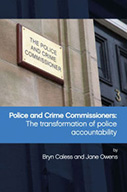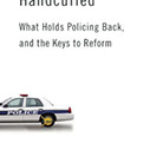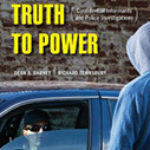POLICE AND CRIME COMMISSIONERS: THE TRANSFORMATION OF POLICE ACCOUNTABILITY

Authors: Bryn Caless and Jane Owens
Publisher: Bristol, UK: Policy Press (distributed in the U.S. by the University of Chicago Press), 2016. 256p.
Reviewer: Jonathon A. Cooper | January 2017
Caless and Owens’s volume describes, chronicles, and assesses the creation and implementation of Police and Crime Commissions (PCC) in the United Kingdom during the second decade of the twenty-first century. Given the novelty of PCCs, and the care and detail with which Caless and Owens treat their subject material, this book is at once timely and important. It is timely insofar as it generates a snapshot of PCCs at their genesis, which will be useful for future analysis and retrospective. And it is important because PCCs represent arguably the first serious and the most original attempt to implement community policing since Angell presented the concept of “democratic policing” in the early 1970’s. (Perhaps the Chicago police department’s long lived but now ended CAPS program being a rules-proving exception).
The book itself reports on a host of qualitative data gleaned from 2013-2015, through interviews with PCCs and chief constables, inter alia, concerning a number of topics, including: the relationship between PCCs and the police; how well PCCs handled the media when it came to policing and crime; and what the future may hold for PCCs in the United Kingdom. Chapter 1 lays out the political rationale and historical context that made way for PCCs in 2012, and chapter 2 considers the problems that haunted the elections of the first PCCs this same year. Such problems included poor voter turnout in tandem with poor ballot organization, to say nothing of the degree to which the process itself became politicized. Chapters 3, 4 and 5 fully consider the relationship between PCCs and their police counterparts, other jurisdictions (e.g., the Home Office and local community organizations), the media, and the public. Finally, chapters 6 and 7 explore what the PCCs themselves wanted to accomplish vis-a-vis the police, how well those visions were received, and the impact on the personal and professional lives of PCCs, in addition to speculating about the future of the entire institution of Police and Crime Commissions.
As I’ve already indicated, this book is worthy of the consideration of any police scholar or student, particularly at the graduate level. While the jury is certainly still out on the effectiveness and impact on PCCs, however one may define such concepts, Caless and Owens provide a depth of narrative that is rich and reminiscent of some of the policing classics from the 1960’s (such as Rubinstein’s City Police). For example, consider the polar opinions of two chief officers, whose quotations begin chapter 3, a chapter which covers the relationship between PCCs and the police: “The PCC came into this job on the back of a tiny number of people who voted…And we’re stuck with this party hack who now tells us that he is empowered to make changes and that we’d better all look out.” As opposed to: “I think that this PCC has made a difference already and working with him is exciting and different.” The same chapter quotes two PCCs, as well, who also express divergent views: “Most chief constables in 2012 were rampant egoists or else on some kind of personal power trip…” Juxtaposed against this: “I was pleasantly surprised to find that most of my chief officer team is not at all averse to change; they listen well and they challenge back to me, which is healthy and stimulating.”
Such diametric opinions are reflected in chapter 6, as well, which concerns changes the PCCs wanted to see in policing. These changes reflected a neighborhood/community focus. Although shared by the chief officers, they nevertheless felt that PCCs placed neighborhood concerns above the more serious crimes that also demanded attention. These are not new problems to the function of the police; but the idea of PCCs as a distinct way of working through such problems is novel. Indeed, the other issues covered throughout the book are not necessarily all that new: concerns over the media, power struggles, issues of role conflict, the interference of politics, both local and national, etc. It is for this reason that the study of PCCs, especially at this nascent stage, is so important, and why Caless and Owens’s volume is so compelling.
Dr. Cooper is the director of the Criminology Advising Center


